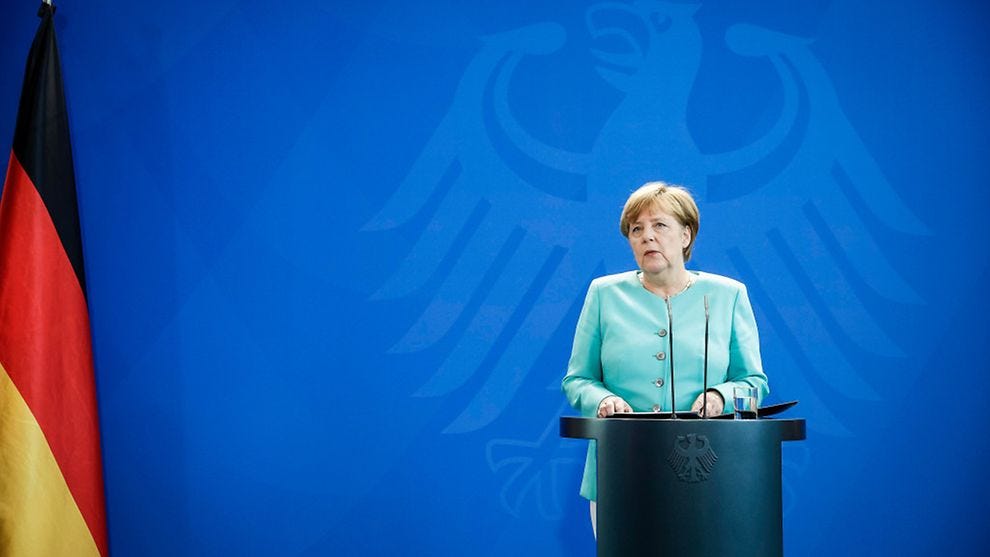Germany and Russia's energy politics, the Havana syndrome strikes again and furore over HK's quarantine rules
August 2021
Goodbye August, hello September! 👋
Welcome to the latest edition of Deep Dive.
The unfolding tragedy in Afghanistan continues to dominate news headlines across the globe, but this newsletter will focus on a few other developments that emerged in what’s been an exceptionally busy summer period.
“A GEOPOLITICAL WEAPON”
Angela Merkel has wrapped up her ‘farewell tour’ as German Chancellor. Perhaps the most scrutinised meeting was her final encounter with Vladimir Putin in Moscow on 20 August.
One of the main topics on their agenda was Nord Stream 2, a 1,225km gas pipeline that would double the supply Russia sends to Germany. The US$11 billion project is hugely controversial and remains a source of friction between Washington and Berlin.
To recap: Nord Stream 2, which is nearly complete, is designed to deliver Russian gas directly to Germany via the Baltic Sea, bypassing Ukraine and Poland.
Opponents of the pipeline list the following concerns:
Nord Stream 2 isn’t compatible with EU climate goals to curb fossil fuels
It significantly increases the region’s dependence on Russian energy exports
The Kremlin might use it as leverage over Europe by threatening to turn off the taps, especially when inventories are low
Ukraine could become politically isolated and lose billions in annual transit fees from older gas pipelines. President Zelensky in Kiev described Nord Stream 2 as “a dangerous geopolitical weapon”.
The US, under the Trump and Biden administrations, had introduced sanctions targeting the project. They argued that Nord Stream 2 was a massive security risk (plus, it’ll probably cut demand for American liquefied natural gas).
But analysts think Merkel scored a foreign policy victory in July when she convinced President Biden to drop those penalties. Instead, both sides promised to support Ukraine and to impose sanctions on Russia if it tries to take advantage (this wasn’t clearly defined). Additionally, Germany will invest in alternative energy infrastructure in Ukraine.
In reality, the pact is a small price for Berlin to pay in exchange for smoother relations with the White House - an important ally - and affordable gas supplies.
MYSTERIOUS EMBASSY ILLNESS
International diplomats normally dismiss any comparisons between their actual work and what’s portrayed in espionage dramas. However, the ongoing intrigue around the so-called “Havana syndrome” certainly belongs in a spy thriller.
The ailment once again grabbed attention this month when the US vice-president’s flight from Singapore to Hanoi was delayed by several hours. The reason given by the US State Department was a “possible anomalous health incident” in the Vietnamese capital. Other details weren’t provided but reporters quickly made connections to the mysterious illness that’s impacted dozens of embassy staff members around the world.

The Havana syndrome was first documented in Cuba in 2016 when some US officials, including CIA operatives, complained of unusual sound and pressure sensations in their heads. These caused pain, dizziness, nausea, memory problems and so on.
Since then, similar symptoms have been noted by US government personnel in China, Russia and, more recently, Western Europe. On 18 August, the Wall Street Journal said at least two Americans stationed in Germany required medical treatment, while a spate of suspected cases were observed in the new syndrome “hot spot” of Vienna, Austria.
Despite the apparent seriousness of the illness, little is known about the Havana syndrome. Scientists have found the effects to be consistent with concussions or brain trauma, but none of the victims were physically hurt. Exposure to toxic chemicals and drugs have also been ruled out. The leading theory is that a kind of mechanical device is emitting harmful levels of ultrasonic or microwave energy.

US intelligence agencies haven’t publicly blamed anyone for the alleged attacks, although Russia is often alluded to as the culprit. Yet many do wonder if the syndrome is an elaborate propaganda tool by Washington to further demonise Moscow.
CAUSE CÉLÈBRE
An unlikely figure has united Hong Kong’s divided society: Nicole Kidman. The city’s residents (young and old, foreign and local) are furious about the Hollywood star’s red carpet welcome amid tightening entry rules.


A bit of background info: In order to uphold its “zero Covid” strategy, HK maintains extremely strict border controls. Travellers must spend either 14 or 21 days (depending on their departure point, vaccination status and antibody tests) in hotel quarantine at their own expense. The government briefly allowed 7 or 14-day hotel stays in July, but HK’s medical experts panicked about the relaxation and demanded a return to previous measures.
Just as hundreds of Hongkongers were scrambling to cancel flights or extend their hotel quarantine reservations, in comes Nicole Kidman on a private jet from Australia. The Oscar winner, who is producing a TV series set in the Chinese city, was permitted to self-isolate at a luxury mansion and was even spotted out shopping shortly after her arrival. [It’s worth noting that HK’s Olympic athletes were asked to finish their compulsory hotel sentences following the Tokyo games.]
Kidman’s quarantine exemption has sparked outrage, forcing the territory’s top lawmakers to defend their actions. In a statement, the HK government said the filming work “is conducive to maintaining the necessary operation and development of Hong Kong's economy”. Furthermore, Kidman and her crew were instructed to travel in private vehicles to avoid contact with the public. Make of that what you will.

The source material of Kidman’s Amazon Prime show is ruffling feathers as well. Her production is based on a 2016 novel called The Expatriates, which tracks the lives of affluent women in HK’s expat bubble. Various writers say the content seems tone deaf in the wake of the 2019 protests, Beijing’s subsequent crackdown and the coronavirus pandemic.
Thanks for reading! Take care and stay curious, Sara x




